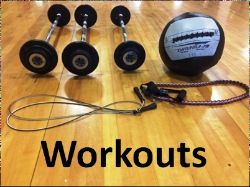Hi There,
How's your day going?
As many of you may know, Pilates is a huge part of my life. I love teaching, taking, and learning about Pilates each and every day. It brings me great joy to help my students enjoy the benefits of Pilates and see the changes it can make in their lives.
Many women believe that they have to cease doing any type of Pilates as soon as they get pregnant. This is simply not the case. Sure, we definitely need to modify a few things, but the low impact, core centered nature of Pilates makes it a wonderful workout to do while pregnant.
I have taught 2-3 Pilates and/or Barre classes almost every day throughout my entire pregnancy and definitely think it has helped keep my core strong and assisted in maintaining a healthy weight. I am definitely having to modify most of the exercises at this point, but I plan to keep up with my Pilates workouts until I deliver sweet Annabelle. With that being said, Barre classes are a great way to enjoy the core strengthening benefits of Pilates without having to do a lot of work lying on your back. Since entering my third trimester, I am teaching more and more barre classes. I can do almost and entire barre class without any discomfort so that is fabulous!
Today, I want to talk about the benefits of Pilates and Barre during pregnancy and some precautions to think about during each trimester.
Benefits of Pilates During Pregnancy:
●
Pilates
strengthens your core muscles, which equips your body to better cope with
the strains caused by the weight of your growing baby.
●
It can reduce
back pain, by exercising the deepest core muscles that stabilize your back
and pelvis.
●
Pilates
exercises can also help strengthen your pelvic floor, which will help to
support your bowel, bladder and uterus (womb) as your baby grows and moves
down.
●
Helps improve
your balance. As your body weight shifts and your hormones change, your
balance can be thrown off. Pilates and Barre exercises can help you stabilize
your core which helps with balance.
●
It teaches you
to relax and control your breathing, which is important for pregnancy and
labor.
●
Pilates can also
assist with maintaining a healthy weight throughout your pregnancy.
●
Increased
confidence Regular exercise during pregnancy can improve your overall mood
and body image.
First Trimester Precautions:
●
Always check with your healthcare provider before doing
any type of exercise while pregnant.
●
Slow down your movements. Always feel free to move at
your own pace and limit your range of motion. Listen to your body for guidance.
As the relaxin starts to increase in your body, your joint can become looser so you want to be careful with movements that require a large range of motion.
●
Don’t stretch any joint to its full range of motion,
especially in an unsupported position. The hormone relaxin will loosen
ligaments during pregnancy, therefore it is essential to be careful during
exercises with deep stretching or larger ranges of motion.
●
Be patient with balance exercises. As the weight shifts
in your body and your hormones begin to change, you may find exercises that
require balance more difficult (use barre for support).
 |
This is an example of a wedge used to elevate the heart above the hips.
You can also use pillows or yoga blankets if you don't have a wedge (source). |
Second Trimester Precautions:
●
Focus on contracting your transverse abdominals and
pelvic floor muscles. You should be able to pull your belly button towards the
mat while performing an exercise. If you cannot, limit the range of motion
until you can do so.
●
Avoid lowering legs to the point where your lower back
lifts off the mat (especially during single leg stretch, scissors, lower lift,
and criss cross).
●
Limit the range of motion during twisting exercises (for
example, saw and criss cross).
●
Trade exercises that require you to lie on your belly
for exercises on all fours such as spine stretch and cat.
●
Once you are further into your second trimester, you
will want to utilize props to keep your upper body elevated so you are not
lying flat on your back. The Pilates ball is also a great way to perform abdominal exercises without having to lie flat on your back. It is one of my favorite tools for prenatal Pilates!
●
Separate the knees to make room for the belly on
exercises where your knees are coming in towards your chest.
●
When in doubt, leave it out.
 |
Core work with the Pilates ball is a wonderful way to engage your
abdominals without having to lie on your back (picture source). |
Third Trimester
Precautions:
●
Keep in mind all precautions we mentioned for the
second trimester.
●
Add an additional blanket under your back and head to create more of an incline
behind your back. You can also use pillows and some Pilates studios even have an actual "wedge" you can use to keep your heart elevated.
●
Decrease your range of motion to make room for your
growing baby (especially when pulling your knees in towards your chest).
● Consider
focusing more on barre classes where you spend the majority of the class
standing.
Many studios have prenatal specific classes available for mommy-to-be's. If you can't find a prenatal specific class, be sure to let your instructor know before class that you are pregnant. They should be able to guide you through proper modifications. The number one rule of thumb is to listen to your body. If something hurts or doesn't feel right, leave it out or pick an exercise you know you feel comfortable with.
Stay tuned for another post with prenatal modifications for common Pilates exercises! I hope you all have a wonderful day.
In health,






















This is totally awesome.Although variety of article on this topic,this article contains some of the precious points which can never be read in other articles.
ReplyDeleteYes, it really works. New York Pilates movements target your tummy, pelvic floor muscles, and back muscles, which are all key to smart posture, balance, and strength.
ReplyDeleteRegular exercise during pregnancy will help you tone pelvic and abdominal muscles that support the growing baby and make childbirth easier.
ReplyDeleteAntenatal Exercises During Pregnancy